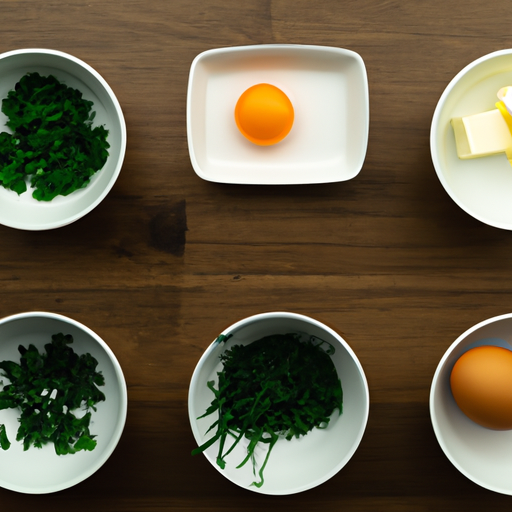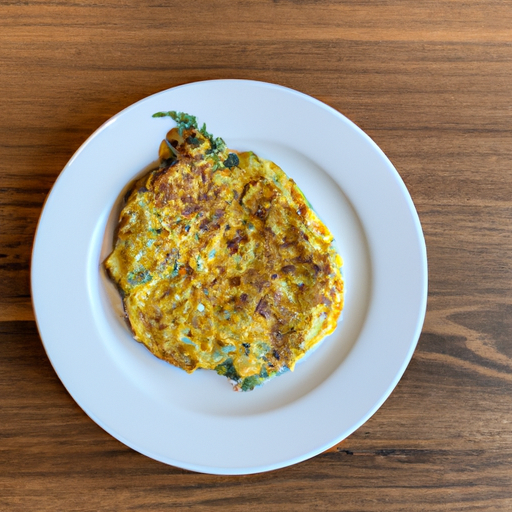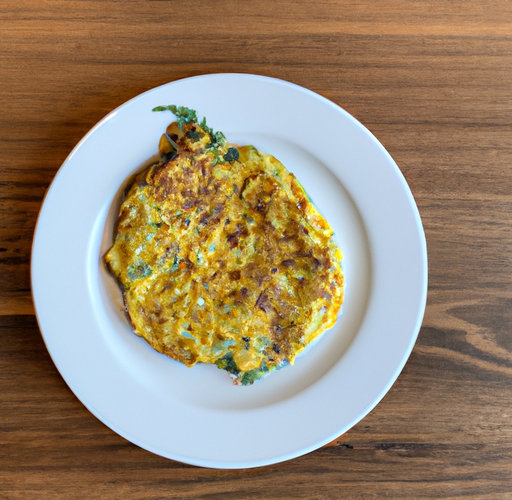Welcome to our Omelette Recipes website! Today, we are excited to share with you an incredible recipe for Persian omelette. This dish is a wonderful combination of eggs, herbs, and spices that create a savory and fragrant omelette. The beauty of this recipe is that it’s quick and easy to make, yet it’s packed with flavor and nutrition. So,let’s get started on making this delicious Persian omelette that will surely impress your family and friends! We’ve made this persian omelette recipe easy to follow 👨🍳.

Ingredients
- 4 large eggs
- 1/4 cup chopped fresh chives
- 1/4 cup chopped fresh parsley
- 1/2 teaspoon kosher salt
- 1/4 teaspoon freshly ground black pepper
- 2 tablespoons unsalted butter
Instructions
- Beat 4 large eggs in a medium bowl together with 1/4 cup chopped fresh chives, 1/4 cup chopped fresh parsley, 1/2 teaspoon kosher salt, and 1/4 teaspoon freshly ground black pepper.
- Melt 2 tablespoons unsalted butter in a non-stick skillet over medium heat.
- Add the egg mixture to the skillet and gently stir with a spatula to evenly distribute the herbs.
- Cook for 2-3 minutes, until the bottom of the omelette is set.
- Using a spatula, fold the omelette in half and cook for an additional 1-2 minutes, or until the eggs are fully set.
- Slide the omelette onto a plate, cut into wedges, and serve.

How long does persian omelette last in the fridge?
Persian omelette, also known as kuku sabzi, can generally be stored in the fridge for up to 3-5 days after cooking. To store it properly, allow it to cool completely before placing it in an airtight container or wrapping it tightly with plastic wrap. It is important to refrigerate it promptly after cooking and not leave it at room temperature for longer than 2 hours. When reheating, make sure to do so thoroughly, until the omelette is heated through, to avoid the risk of foodborne illness. Overall, it is best to consume the omelette within a few days to enjoy its best flavor and texture.
Low calorie persian omelette recipe substitutions
To make this Persian omelette recipe lower in calories, some substitutions can be made. First, instead of using unsalted butter, a lower-calorie option like olive oil cooking spray or a small amount of vegetable oil can be used to grease the skillet. Secondly, reducing the number of eggs to three or even two and adding egg whites can reduce the overall calorie count and retain the texture. Additionally, low-fat cheese or skim milk can be used instead of full-fat cheese or cream. Finally, using less oil and cooking the omelette over lower heat for a longer time can also cut the calorie count. By adopting these substitutions, it’s possible to make a delicious Persian omelette while still keeping the calorie count under control.
What to serve with a persian omelette?
Persian omelette, also known as kuku, is a flavorful vegetarian dish that is perfect for a light lunch or dinner. To enhance its taste, you may want to serve it with a side salad of mixed greens dressed with a tangy and sweet vinaigrette. You could also add some crusty bread or pita to the meal, making it more filling. For an extra burst of freshness, add some herbs like parsley or cilantro to the omelette. With these additions, your Persian omelette will be a complete meal that is both delicious and fulfilling.
Whats the best sauce for a persian omelette?
One of the most popular sauces to accompany Persian omelette is Mast-o-Khiar, a yoghurt, cucumber, and mint-based sauce. Its tangy and refreshing taste complements the rich and savory flavors of the omelette perfectly. To make the sauce, whisk together Greek yoghurt, grated cucumber, chopped fresh mint, garlic, salt, and pepper. Let it chill in the fridge for at least 30 minutes before serving. Alternatively, you can also serve the omelette with a dollop of harissa sauce, a spicy Tunisian chili paste that adds a complex and fiery note to the dish.
Persian omelette health benefits
Persian omelette, also known as kuku sabzi, is a nutritious and healthy dish. It is made with various green herbs such as parsley, cilantro, and dill, which are rich in vitamins, minerals and antioxidants. The eggs used in the dish are a good source of protein, vitamins, and omega-3 fatty acids. The combination of herbs, eggs, and spices in this dish gives it a unique flavor and helps to boost metabolism, improve digestion and promote overall health. Additionally, the greens used in the dish are a good source of iron and can help prevent anemia. Therefore, if you are looking for a healthy breakfast or snack recipe, Persian omelette is an excellent choice.
Post | Title | Ratings | Link |
 | Turkey and Cheese Omelette | ||
 | Goat Cheese and Tomato Omelette | ||
 | Tomato and Mozzarella Omelette |
















